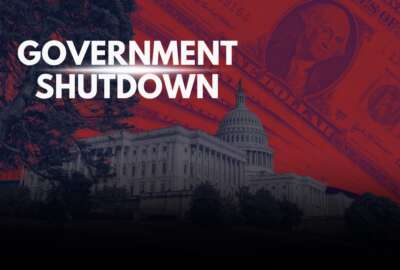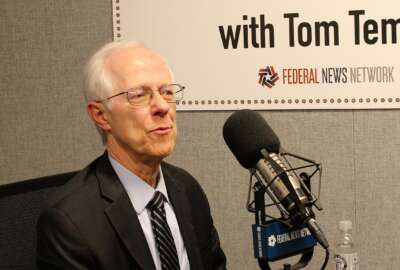Less than a week in, contractors sort out the meaning of the 45-day continuing resolution
The continuing resolution, which lasts until November 17, takes a six-and-a-half week bite out of fiscal 2024's calendar. In a sense, it resets the countdown to...
The continuing resolution, which lasts until November 17, takes a six-and-a-half week bite out of fiscal 2024’s calendar. In a sense, it resets the countdown to a government shutdown, especially if House Republicans succeed in ousting Speaker Kevin McCarthy, which, in case you hadn’t heard…happened. Contractors have been sorting out what it all means. For an update, Federal Drive Host Tom Temin spoke with Stephanie Kostro, the Executive Vice president for Policy at the Professional Services Council.
Interview Transcript:
Stephanie Kostro It sounds that way, although, you know, the train wreck is still a potential right at the end of the day. This is a continuing resolution. It is not a set of 12 full year appropriations bills. And that’s what the Fiscal Responsibility Act of 2023 passed earlier this year requires. You know, if we don’t get all 12 full year appropriations acts passed and signed into law by the President by January 1st. The word we haven’t talked of, you know, it’s kind of the Voldemort of federal funding, right, of that of which should not be spoken. Sequestration happens early next year if they don’t pass all 12 bills and a 1% haircut across all federal programs will happen. So we are watching it very closely. What Congress is doing on those 12 full year appropriations bills and advising our member companies of what they need to watch out for as well.
Tom Temin Yeah, And so for companies that are doing business with the government or hope to, it’s really hard to tell what this all means. I mean, we have a C.R. now, and so people that had bids out for awards for new programs, that’s still on hold. Right.
Stephanie Kostro Right. We’re still under the typical continuing resolution restrictions of no new starts, etc. Now, what’s good is, you know, we’re continuing FY 23 funding levels, which for some agencies is better than they would have gotten under the Fiscal Responsibility Act. That said that specter of shutdown looms again come November 17th. And, you know, as we watch what’s going on in the House and to some extent in the Senate, wondering whether or not appropriations bills can be passed and will we be facing another short term C.R. come mid-November.
Tom Temin And agencies can always impose stop work orders if they feel they don’t have the money. And that could really hit very suddenly and be a kind of unpleasant surprise.
Stephanie Kostro You know, Tom, I’m glad you raised that, because when we think about a shutdown or lapse in appropriations, it’s oftentimes the contractors who bear the brunt of those actions without funding contracts are subject to stop work orders. And my concern lately has been really focused on the smaller companies that don’t have the operating funds. They don’t have access to lines of credit. You know, they may well have to furlough or lay off some of their critical employees. And in this tight job market, it’d be tough to get those folks back working on a government contract when funding is restored. So we are looking at a perfect storm of workforce shortages, funding shortages and a lot of inconsistency and uncertainty on the congressional front. So this is an area where PSC is tracking a lot very, very closely.
Tom Temin And if you look at that potential 1% sequestration reduction, that could be magnified for contracting activities because if agencies don’t lay anybody off and the federal workforce stays the same size, plus it gets a five or something percent pay raise as it’s expected to do come January 1st, well, then that means it’s really not a 1% across the board. It’s 1% in total, but it’s going to be unevenly distributed. And contracting might take more than a 1% hit.
Stephanie Kostro That’s exactly right. When you look at what the government spends money on, it spends money on military personnel, civilian personnel, contracts and what’s discretionary, and all of this will be the contracts. There’s not going to be a massive reduction in force come January1, 2024 if 12 appropriations bills aren’t passed. And so we are tracking very closely what the intent is here. One issue that also came to the fore because we got so close to a shutdown, a lot of the departments and agencies, the vast majority of the large ones submitted and had posted to the White House website their contingency plans for shutdowns. They talked a lot about designating individuals who work for the government who are exempt from furlough or what we would call colloquially essential personnel. There was very little discussion of that we could see publicly of what they would do with contracts. And so going forward, PSC is going to remain vigilant on making sure that the departments and agencies talk to their contracting officers, who then in turn talk to contractors because this situation of uncertainty, again, I referenced this perfect storm of a tight workforce and potential lack of funding really, really puts government contractors back on their heels.
Tom Temin Yeah, it’s a great partnership, as they like to say, until the squeeze is on. Then you see who’s the senior partner. We’re speaking with Stephanie Kostro. She’s executive vice president for policy at the Professional Services Council. And there’s another practical matter that has come to light, and that is the expiration of waivers for Section 889. Now, that’s the provision in one of the NDAA is of recent years. Which prohibited use of Chinese made telecommunications equipment in federal contracts and federal systems. But waivers were possible under 889. And I guess if you had to have it now, those waivers could expire. And that’s causing some problems.
Stephanie Kostro It is Tom, and I’m glad that you raised this because it is coming to a head in recent months, that is to say 889, which is a bugaboo for some folks in terms of they react very viscerally to hearing those numbers and that combination, really does restrict the government on entering into extending or renewing contracts that have in any way, shape or form a significant reliance on companies like Huawei and others, Chinese telecoms companies as you mentioned. The Department of Defense and other agencies did have waiver authority, but key departments and agencies did not have waiver authority. And these are things like the General Services Administration, which manages multiple awards schedule program, and it didn’t offer such a waiver. So the question then becomes, can GSA accept another agency’s waiver when that agency is the customer? A few weeks ago, GSA officials started to alert entities who hold these programs that there’s no available pathway to a waiver so that they were going to start canceling contracts. This has sent quite a chill through the community of contractors, as you can imagine, because in some countries there is no Verizon. There is no, I almost said MCI, but that’s dating me. Huawei is really the only game in town if you want to be connected to the Internet. And so it’s not just about equipment, it’s about services and support and systems. And there are countries where they have a Chinese backbone and we provide U.S. assistance. And so this is really putting a squeeze on those companies who work in these regions of the world.
Tom Temin All right. So what is the prospect then, if the waivers expire? Are you seeing the cancellation of contracts?
Stephanie Kostro We are seeing the notices to cancel contracts, usually about 30 days out. The companies are getting these notices. We’ve raised this issue with GSA. We will continue to raise it that if that company does hold a waiver from another agency, GSA should consider accepting it. There should be some reciprocity because that company has already gone through the disclosure requirements to get that waiver. So as we move forward, we’re going to encourage sort of common sense approach to, you know, take Ethiopia, for example. You’re not going to find a U.S. provider there of telecoms. You’ll find Chinese. And so if we were going to work with the Ethiopians in exercises and assistance programs, we’re going to have to make an exception in that case.
Tom Temin So that affects the Defense Department potentially. It also affects agencies like the State Department, USAID, in a really a bunch of them that operate programs in distant nations.
Stephanie Kostro That’s exactly right. And they are also the users of these GSA multiple award schedules. And so as we move forward, we’re going to have to work not just with GSA, but with the other agencies to make sure they’re aware of this issue. And we’re all sort of rowing in the same direction on this.
Copyright © 2024 Federal News Network. All rights reserved. This website is not intended for users located within the European Economic Area.
Tom Temin is host of the Federal Drive and has been providing insight on federal technology and management issues for more than 30 years.
Follow @tteminWFED






